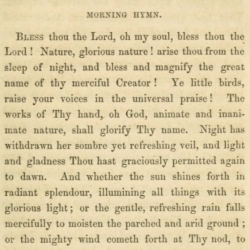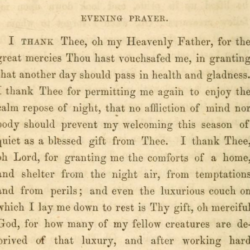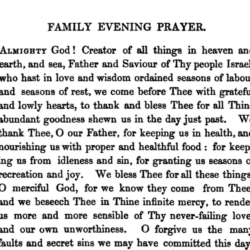Contributor(s): Shared on: 20 May 2023 under the Creative Commons Zero (CC 0) Universal license a Public Domain dedication Categories: Tags: | Contribute a translation | Source (English) |
|---|
|
Evening hymn. | |
Blessed art Thou, O Almighty and All-powerful God,
who ordainest that night should succecd to day. | |
Blessed art Thou,
who in Thy great mercy
hast ordained a season of calm and quiet,
that the children of earth should rest
from the toils and fatigues of labour. | |
The sun which shines forth during the day,
and with its brilliant light and refreshing heat
proclaims Thy power, O God,
hath withdrawn his rays
and that broad light disappears,
and a soft silvery haze succeeds. | |
Unnumbered stars glitter on the dark blue Heavens,
and the silver planet created to give light
to the calm and quiet night,
holds her peaceful sway. | |
All is calm and silent,
nature raises not her voice in loud and joyous strains,
to utter forth Thy praises, O Almighty Father.
Thy creatures whose tongues would praise Thee are at rest,
from man to the lowest worm that crawls on the face of the Earth,
to all, night bringeth calm and peace. | |
But Thy Power, Thy Majesty O God!
is seen and proclaimed even in the silent night,
though the tongue of man is dumb.
Nature has lost her glittering splendour,
but the pale moon that shines forth
on her dark blue throne,
proclaims the glory of her Maker!
and each star that shines forth,
and twinkles in the Heavens,
has a language of its own,
and proclaims the glory,
and the power,
and the holiness of God! | |
I look forth in the still night,
and my heart is lifted up in adoration and in love,
but words are lost.
I would sing forth Thy Glory, O God,
in a song of praise,
but my lips are dumb with overflowing love
and grateful adoration. | |
Nature praises Thee and blesses Thee, O God,
the voice of nature shouts forth Thy Almighty Glory.
Blessed art Thou, O God of Heaven.
Blessed be Thy great name now and evermore! |
“Evening Hymn (Blessed art Thou)” by Grace Aguilar was published posthumously by her mother Sarah Aguilar in the UK edition of Sacred Communings, pp. 94-95. It is not found in the US edition. Source(s)
 Grace Aguilar (2 June 1816 – 16 September 1847) was an English novelist, poet and writer on Jewish history and religion. Although she had been writing since childhood, much of her work was published posthumously. Among those are her best known works, the novels Home Influence and A Mother's Recompense. Aguilar was the eldest child of Sephardic Jewish refugees from Portugal who settled in the London Borough of Hackney. An early illness resulted in her being educated by her parents, especially her mother, who taught her the tenets of Judaism. Later, her father taught the history of Spanish and Portuguese Jews during his own bout with tuberculosis which had led the family to move to the English coast. After surviving the measles at the age of 19, she began to embark on a serious writing career, even though her physical health never completely recovered. Aguilar's debut was an anonymous collection of poems, The Magic Wreath of Hidden Flowers. Three years later she translated Isaac Orobio de Castro's Israel Defended into English at her father's behest. Later her The Spirit of Judaism drew interest and sales in both Britain and the United States after being published in Philadelphia by Isaac Leeser. He added a preface to the work elucidating his differences with her, the first of many clashes her work would have with mainstream Jewish thought. In the 1840s her novels began to attract regular readers, and Aguilar moved back to London with her parents. Despite her success, she and her mother still had to operate a boys' Hebrew school to stay solvent, which she resented for the time and energy it took from her writing. In 1847, she became ill again with a spinal paralysis which she did not let prevent her from visiting her brother in Frankfurt. Her health worsened and she died there that September. Aharon Varady (M.A.J.Ed./JTSA Davidson) is a volunteer transcriber for the Open Siddur Project. If you find any mistakes in his transcriptions, please let him know. Shgiyot mi yavin; Ministarot naqeni שְׁגִיאוֹת מִי־יָבִין; מִנִּסְתָּרוֹת נַקֵּנִי "Who can know all one's flaws? From hidden errors, correct me" (Psalms 19:13). If you'd like to directly support his work, please consider donating via his Patreon account. (Varady also translates prayers and contributes his own original work besides serving as the primary shammes of the Open Siddur Project and its website, opensiddur.org.) Read a comment / Leave a comment (moderated) Works of related interest: |



![morning hymn (Blessed art Thou) [version 1] (Grace Aguilar 1853) - cropped](https://opensiddur.org/wp-content/uploads/2023/05/morning-hymn-Blessed-art-Thou-version-1-Grace-Aguilar-1853-cropped-250x250.png)
![morning hymn (Blessed art Thou) [version 2] (Grace Aguilar 1853) - cropped](https://opensiddur.org/wp-content/uploads/2023/05/morning-hymn-Blessed-art-Thou-version-2-Grace-Aguilar-1853-cropped-250x250.png)

![evening prayer (another day hath passed) [ver. 1] (Grace Aguilar 1853) - cropped](https://opensiddur.org/wp-content/uploads/2023/05/evening-prayer-another-day-hath-passed-ver.-1-Grace-Aguilar-1853-cropped-250x250.png)


![evening prayer (another day hath passed) [ver. 2] (Grace Aguilar 1853) - cropped](https://opensiddur.org/wp-content/uploads/2023/05/evening-prayer-another-day-hath-passed-ver.-2-Grace-Aguilar-1853-cropped-250x250.png)


Leave a Reply